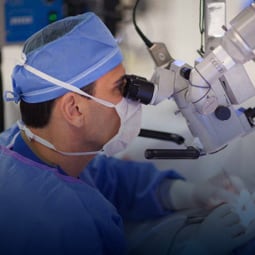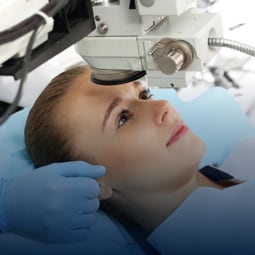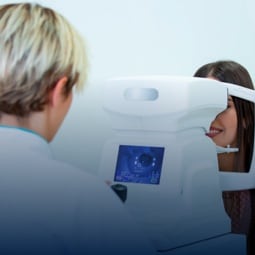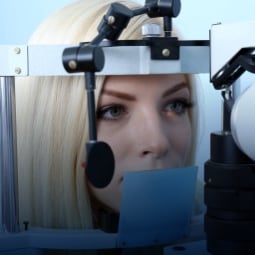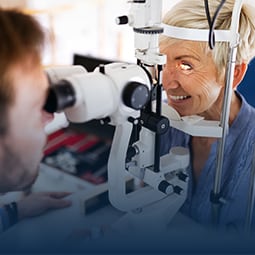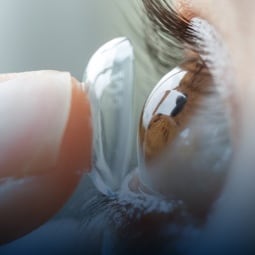
Diabetes Can Affect Your Eye Health
Diabetes can be a complicated condition to live with. It can affect many different aspects of your health, but did you know that it can significantly impact your eye health?
Having diabetes puts you at a higher risk of several eye conditions. With our experience and access to advanced technology, we can identify issues early and help manage your condition.
At Center For Sight, our experienced physicians can help you manage your diabetes while protecting your vision and eye health.
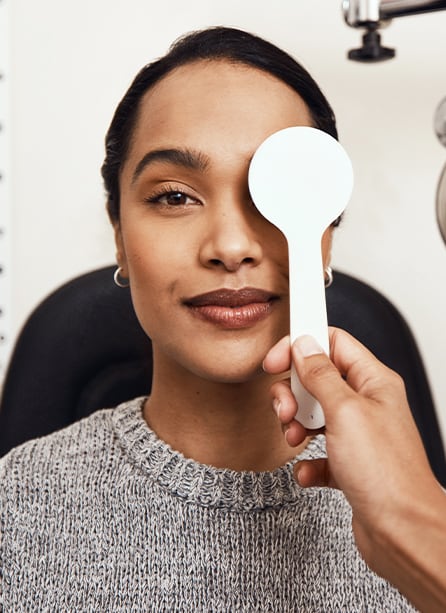

Diabetes & Your Vision
Someone with diabetes cannot produce enough insulin or cannot effectively use the insulin their body produces. Insulin regulates our blood sugar levels, and with improper insulin control, your blood sugar levels can increase, causing problems throughout the body, including your eyes.
High amounts of blood sugar can damage your retina, causing vision problems and potentially leading to severe vision loss.

Diabetes-Related Eye Conditions
If you have diabetes, you’re at a higher risk of developing diabetic eye diseases, potentially leading to vision loss or blindness.
Diabetic Retinopathy
Diabetic retinopathy occurs when diabetes damages the blood vessels, leading to blurry, distorted vision and potential blindness. This disease has 2 stages: nonproliferative and proliferative diabetic retinopathy.
As blood vessels in the retina become damaged, they can close off. As a result, new, abnormal blood vessels grow. These weak blood vessels can bleed into the retina and develop scar tissue.
Diabetic Macular Edema
Diabetic macular edema is a complication of diabetic retinopathy and a common cause of vision loss for people with diabetes. Leaking fluid caused by diabetic retinopathy can cause the macula to swell, leading to potential vision loss.
Diabetic Eye Exam Frequency
When you visit Center For Sight, we’ll always give you a personalized experience. The frequency of diabetic eye exams can vary from person to person, and we can help you find a schedule that fits your eye health needs. We typically follow the recommended guidelines set by the American Diabetes Association, which outline that:
- Adults with type 2 diabetes should receive their first diabetes eye test after their diagnosis
- Anyone with type 1 diabetes should have their first diabetic retinal eye exam within 5 years of diagnosis
- People with diabetes need to have an eye exam at least once a year
We Can Help
Don’t let diabetes affect your vision. With the expertise of the physicians at Center For Sight, we can help protect your eye health and offer recommendations for how you can manage your diabetes.
Book your next diabetic eye exam today to see how we can support your health.

Our Locations
See Our Google Reviews

News
Revolutionizing Vision Correction: The Science Behind Light Adjustable Lenses
Cataracts, Light Adjustable LensesThe field of ophthalmology has made breakthroughs with the Light Adjustable Lens (LAL) from RxSight, changing the nature of post-cataract surgery vision correction. This innovative technology is exclusively produced by Center For Sight and is the only option for this technology available on the market. The premium lens allows precision adjustments to vision after surgery. […]
Read More… from Revolutionizing Vision Correction: The Science Behind Light Adjustable Lenses
Safeguarding your eyes during the solar eclipse
News & UpdatesAre you ready for the upcoming solar eclipse? While this celestial event promises to be a stunning sight, it’s essential to prioritize eye safety to avoid potential harm to your vision. Center For Sight’s Vitreo-Retinal Surgeon, Dr. Tanuj Banker would like to share some crucial tips to help you protect your eyes during the eclipse. […]
Read More… from Safeguarding your eyes during the solar eclipse
Cornea Treatment and Nutrition: Foods That Promote Eye Health
Cornea CareMore than ever, people recognize the link between what they eat and how they feel overall. At Center For Sight SW FL, we believe that nurturing good life habits can directly affect eye health. Our licensed ophthalmologists often hear the question, “What foods can I eat to better my eyesight?” from curious patients. It’s encouraging […]
Read More… from Cornea Treatment and Nutrition: Foods That Promote Eye Health
Revolutionizing Vision Correction: The Science Behind Light Adjustable Lenses

The field of ophthalmology has made breakthroughs with the Light Adjustable Lens (LAL) from RxSight, changing the nature of post-cataract surgery vision correction. This innovative technology is exclusively produced by Center For Sight and is the only option for this technology available on the market. The premium lens allows precision adjustments to vision after surgery. […]
Read More… from Revolutionizing Vision Correction: The Science Behind Light Adjustable Lenses
Safeguarding your eyes during the solar eclipse

Are you ready for the upcoming solar eclipse? While this celestial event promises to be a stunning sight, it’s essential to prioritize eye safety to avoid potential harm to your vision. Center For Sight’s Vitreo-Retinal Surgeon, Dr. Tanuj Banker would like to share some crucial tips to help you protect your eyes during the eclipse. […]
Read More… from Safeguarding your eyes during the solar eclipse
Cornea Treatment and Nutrition: Foods That Promote Eye Health

More than ever, people recognize the link between what they eat and how they feel overall. At Center For Sight SW FL, we believe that nurturing good life habits can directly affect eye health. Our licensed ophthalmologists often hear the question, “What foods can I eat to better my eyesight?” from curious patients. It’s encouraging […]
Read More… from Cornea Treatment and Nutrition: Foods That Promote Eye Health
Check Us Out On Facebook


We are a proud partner of US Eye, a leading group of patient-centric, vertically integrated multi-specialty physician practices providing patients with care in ophthalmology, optometry, dermatology, audiology and cosmetic facial surgery.




